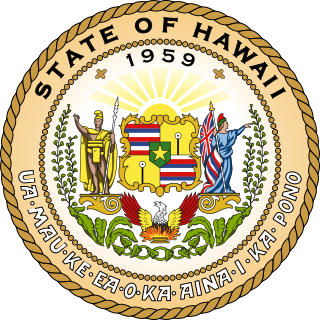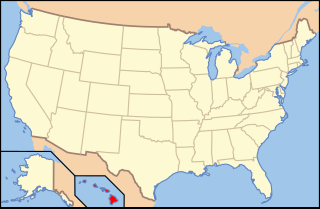Sources
Statewide political officials of Hawaii | ||
|---|---|---|
| U.S. senators |  | |
| State government |
| |
| Senate |
| |
| House |
| |
| Supreme Court |
| |
The president of the Hawaii Senate is the presiding officer of the upper chamber of the Hawaii Territorial and Hawaii State Legislature.
| Name | Period |
|---|---|
| Nicholas Russell | 1901 |
| Samuel E. Kaiue | 1901 |
| Clarence L. Crabbe | 1902–1904 |
| D. Paul R. Isenberg | 1905 |
| E. Faxon Bishop | 1907 |
| William Owen Smith | 1909 |
| Eric Alfred Knudsen | 1911–1913 |
| Charles F. Chillingworth | 1915–1921 |
| Lawrence M. Judd | 1923 |
| Robert W. Shingle | 1925–1932 |
| George P. Cooke | 1933–1935 |
| Harry A. Baldwin | 1937 |
| George P. Cooke | 1939–1941 |
| Harold W. Rice | 1943 |
| Eugene S. Capellas | 1945 |
| Clement Gomes | 1947 |
| Wilfred C. Tsukiyama | 1949–1954 |
| William H. Heen | 1955–1957 |
| Herbert K. H. Lee | 1959 |
| Sen. | Name | Party | Term of service |
|---|---|---|---|
| 1st | William H. Hill | Republican | 1959–1962 |
| 2nd | Nelson K. Doi | Democratic | 1963–1964 |
| 3rd | Kazuhisa Abe | 1965–1966 | |
| 4th | John J. Hulten | 1967–1968 | |
| 5th | David C. McClung | 1969–1974 | |
| 6th | John T. Ushijima | 1975–1978 | |
| 7th | Richard S. H. Wong | 1979 – December 1992 | |
| 8th | James Aki | December 1992 – May 1993 | |
| 9th | Norman Mizuguchi | May 1993 – December 2000 | |
| 10th | Robert Bunda | December 2000 – January 2, 2009 | |
| 11th | Colleen Hanabusa | January 2, 2009 – November 6, 2010 | |
| 12th | Shan Tsutsui | November 6, 2010 – December 27, 2012 | |
| 13th | Donna Mercado Kim | December 28, 2012 – May 5, 2015 | |
| 14th | Ron Kouchi | May 5, 2015 – present |

The governor of Hawaii is the head of government of the U.S. state of Hawaii and its various agencies and departments, as provided in the Hawaii State Constitution Article V, Sections 1 through 6. It is a directly elected position, votes being cast by popular suffrage of residents of the state.

The Hawaii State Legislature is the state legislature of the U.S. state of Hawaii. The state legislature is a bicameral body consisting of a lower house, the Hawaii State House of Representatives, with 51 representatives, and an upper house, the 25-member Hawaii State Senate. There are a total of 76 lawmakers in the legislature, each representing single member districts across the islands. The powers of the legislature are granted under Article III of the Constitution of Hawaii. The legislature convenes at the Hawaii State Capitol building in the state capital of Honolulu, on the island of Oahu.

The Hawaii House of Representatives is the lower house of the Hawaii State Legislature. Pursuant to Article III, Section 3 of the Constitution of Hawaii, amended during the 1978 constitutional convention, the House of Representatives consists of 51 members representing an equal number of districts across the islands. It is led by the Speaker of the House elected from the membership of the House, with majority and minority leaders elected from their party's respective caucuses. The current Speaker of the House is Scott Saiki.

The Hawaii State Senate is the upper house of the Hawaii State Legislature. It consists of twenty-five members elected from an equal number of constituent districts across the islands and is led by the President of the Senate, elected from the membership of the body, currently Ron Kouchi. The forerunner of the Hawaii Senate during the government of the Kingdom of Hawaii was the House of Nobles originated in 1840. In 1894, the Constitution of the Republic of Hawaii renamed the upper house the present senate. Senators are elected to four-year terms and are not subject to term limits.

The Constitution of the State of Hawaii, also known as the Hawaii State Constitution, is the fundamental governing document of the U.S. state of Hawaiʻi. As an organic text, it establishes the principles and framework of government, enumerates the rights and freedoms of Hawaiian citizens, and serves as the supreme law of the state.
"Hawaiʻi Aloha," also called "Kuʻu One Hanau," is a revered anthem of the native Hawaiian people and Hawaiʻi residents alike. Written by the Reverend Lorenzo Lyons, (1807-1886), also known as Makua Laiana, a Christian minister who died in 1886, to an old hymn, "I Left It All With Jesus," composed by James McGranahan (1840-1907), "Hawai‘i Aloha" was considered by the Hawaiʻi State Legislature in 1967 and by the Hawaiʻi State Constitutional Convention in 1978 to become the official state song, but "Hawaiʻi Pono‘ī," written by King David Kalākaua and composed by Royal Hawaiian Band Master Henri Berger, was chosen instead.

The 1887 Constitution of the Hawaiian Kingdom was a legal document prepared by anti-monarchists to strip the absolute Hawaiian monarchy of much of its authority, initiating a transfer of power to a coalition of American, European and native Hawaiian people. It became known as the Bayonet Constitution for the rising by the armed militia which forced King Kalākaua to sign it or be deposed.
In 1898, the United States Congress annexed Hawaiʻi based on a Joint Resolution of Annexation. Questions about the legitimacy of the U.S. acquiring Hawaii through a joint resolution, rather than a treaty, were actively debated in Congress in 1898, and is the subject of ongoing debate. Upon annexation, the Republic of Hawai‘i transferred approximately 1.8 million acres of Hawaiian Government and Crown Lands to the United States (U.S.), which are today held by the State of Hawaiʻi. In the 1993 Apology Resolution, the U.S. government officially apologized to the Native Hawaiian people, acknowledging that the Republic of Hawaiʻi transferred these lands "without the consent of or any compensation to the Native Hawaiian people of Hawaiʻi or their sovereign government" and that "the indigenous Hawaiian people never directly relinquished their claims. .. over their national lands to the United States." Although the lands are commonly referred to as "ceded lands" or "public lands," some refer to them as "seized lands" or "Hawaiian national lands" or "crown lands" to highlight the illegal nature of the land transfer, acknowledge different interpretations of the legal effect of the Joint Resolution, and to recognize that Native Hawaiians maintain claims to these lands. Many Native Hawaiian individuals and organizations insist on the return of title, which would be consistent with international law and recognition of the rights of Indigenous peoples, whereas others seek back rent for the use of the land.

Constitutional Amendment 2 of 1998 amended the Constitution of Hawaii, granting the state legislature the power to prevent same-sex marriage from being conducted or recognized in Hawaii. Amendment 2 was the first constitutional amendment adopted in the United States that specifically targeted same-sex partnerships.

Same-sex marriage has been legal in Hawaii since December 2, 2013. The Hawaii State Legislature held a special session beginning on October 28, 2013, and passed the Hawaii Marriage Equality Act legalizing same-sex marriage. Governor Neil Abercrombie signed the legislation on November 13, and same-sex couples began marrying on December 2. Hawaii also allows both same-sex and opposite-sex couples to formalize their relationships legally in the form of civil unions and reciprocal beneficiary relationships. Civil unions provide the same rights, benefits, and obligations of marriage at the state level, while reciprocal beneficiary relationships provide a more limited set of rights.

The Legislature of the Hawaiian Kingdom was the bicameral legislature of the Hawaiian Kingdom. A royal legislature was first provided by the 1840 Constitution and the 1852 Constitution was the first to use the term Legislature of the Hawaiian Islands, and the first to subject the monarch to certain democratic principles. Prior to this the monarchs ruled under a Council of Chiefs.

The Hawaii Department of Transportation (HDOT) is a state government organization which oversees transportation in the U.S. state of Hawaii. The agency is divided into three divisions dealing with aviation, maritime, and roads.

Lesbian, gay, bisexual, and transgender (LGBT) people in the U.S. state of Hawaii enjoy the same rights as non-LGBT people. Same-sex sexual activity has been legal since 1973; Hawaii being one of the first six states to legalize it. In 1993, a ruling by the Hawaiʻi Supreme Court made Hawaii the first state to consider legalizing same-sex marriage. Following the approval of the Hawaii Marriage Equality Act in November 2013, same-sex couples have been allowed to marry on the islands. Additionally, Hawaii law prohibits discrimination on the basis of both sexual orientation and gender identity, and the use of conversion therapy on minors has been banned since July 2018. Gay and lesbian couples enjoy the same rights, benefits and treatment as opposite-sex couples, including the right to marry and adopt.

Daynette 'Dee' Morikawa is an American politician and a Democratic member of the Hawaii House of Representatives since November 2, 2010 representing District 17.

A general election was held in the U.S. state of Hawaii on November 3, 2020. Paper ballots for voting by mail were sent to all registered voters in the state.

The 2022 Hawaii Senate elections were held on November 8, 2022, to elect senators in all 25 districts of the Hawaii Senate. Due to the chamber's use of the 2-4-4 term system, members were elected in single-member constituencies, with half of them serving two-year terms and the other half serving four-year terms. These elections were held concurrently with various federal and state elections, including for governor of Hawaii. Partisan primaries were held on August 13.